The Myth of Menstrual Bliss
Age doesn’t diminish the embarrassment. Or the pain. Or discomfort. You simply learn to accept.

“No matter what people say, and no matter how common menstruation is, young girls are quite embarrassed about having it.” On a website where the topic of menstrual taboos across religions was being discussed, a 14-year-old Norwegian girl posted this comment. “Not only young girls,” I wanted to add.
Age doesn’t diminish the embarrassment. Or the pain. Or the discomfort. You simply learn to accept. The hard truth is nobody likes to bleed. ‘#HappyToBleed’ is a stellar example of women raising their hackles as religious pundits and regressive individuals try to tell them they’re polluted or inferior. Whether someone makes a festival of it or calls it a divine process, the troubles are going to remain.
Today we have painless childbirth, but for painful menstruation there’s no remedy but the good old painkillers. Medical research has either failed to address this problem or the pharma giants have kept it alive so their painkillers would sell in bulk. Unexpected arrival of the menses, leakage and staining of clothes, non-availability of suitable places for changing or disposal of sanitary napkins, abdominal cramps and acute pain right in the middle of a crucial exam or a business meeting or a thrilling holiday – these are the stuff that women’s nightmares are made of.
And when we are young we feel everything more intensely. So little girls hate their periods more passionately than older women do.
In recent times there have been attempts to put forth the suggestion that the ancient practices of seclusion of menstruating women were devised for their own benefit.
Women would be freed from the burden of housework, never mind if they’re treated as untouchables for a few days. Perhaps this formula worked as long as households had multiple women to share the chores among themselves. But today the scene has changed because the nuclear family has only one woman or perhaps two.
The rest-and-recreation theory simply doesn’t hold water. Women in the unorganised sector are paid daily wages, those in the organised sector have to show up at the workplace or face the consequences, and women in high places find it even more difficult to take time off from work because they’re running on a 24/7 schedule throughout the year.
Rest and recreation come only at a price, whether you are a daily wage earner or formally employed. In the present family setup where women spend twice as much time as men attending to domestic chores and caring for children, menstruation doesn’t offer any break from this drudgery.
The well meaning gentlemen who say that Hinduism envisages rest for women during their periods should tell us who will cook the food, breastfeed the infant, put the toddler to sleep, and minister to the miniscule needs of the TV watching ‘head’ of the household.
In Nepal in 2017 a teenager died of snakebite in a menstruation hut. In another horrific incident in January this year a woman and her two minor sons died of suffocation in a menstruation hut because the woman had lighted a fire to protect them from the severe cold. The government of Nepal had banned the seclusion of women during menstruation but social evils die hard.
India has its own stock of menstruation related horror stories. Nepal is the world’s only Hindu country, so all the trending propaganda about Hindus respecting women and all that doesn’t cut any ice.
Menstruation isn’t a health and hygiene issue either. Sanitary pads aren’t a one stop solution to all feminine woes, as the television ads would have us believe. Pads need to be changed regularly and disposed properly. They’re far too expensive and beyond the reach of the poor.
Girls in our country miss school because they can’t afford menstrual products. Re-useable menstrual cups are now on the market and they’re incredibly pocket-friendly but you’ve to learn to insert them and the awareness is yet to spread.
Menstruation is talked about only in whispers, thus any useful information spreads very slowly, social media magic notwithstanding. The obsession with passing the virginity test on marriage effectively blocks the use of tampons and similar fears are likely to hamper the use of menstrual cups too.
Girls everywhere in the world need guidance and role models. Chinese swimmer Fu Huanyi became an instant internet sensation when her team won a bronze at the Rio Olympics and she announced she was sorry to let down her team-mates because she was on her period and couldn’t give her best performance. Women and girls wondered how someone could go swimming at such a time without painting the pool red.
While the impurity debate goes on, doctors and scientists would do a great service to womankind if only they’d find a way to stop menstruation for good. A few cycles and off go the eggs to the Ovum Bank for future use! Or you can join the happy-to-bleed brigade and continue to have your periods until you’ve had a child or two, after which you can choose to permanently remove the menace. One injection and no more menses – howzzat!!? Or better still, no more pregnancies, only test-tube conceptions and incubator-hatched babies. That way the size zero babes can keep their hourglass figures.
But there’s a flip side. In a verbal spat with your significant other you’ll no longer be able to remind him where he came from!
(The author is an IT professional)
